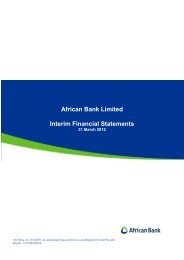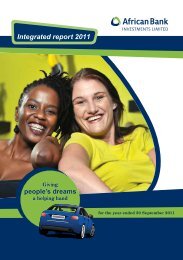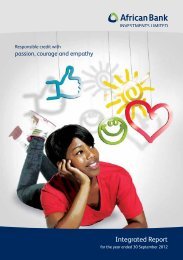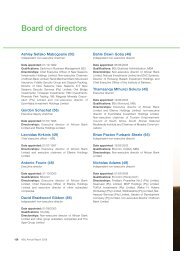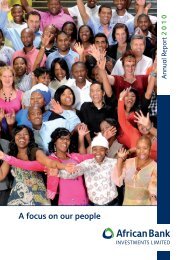Download - African Bank
Download - African Bank
Download - African Bank
Create successful ePaper yourself
Turn your PDF publications into a flip-book with our unique Google optimized e-Paper software.
Letter to stakeholders continued<br />
develop a comprehensive<br />
organisation-wide sustainability<br />
strategy. Examples of such strategies<br />
are aligning the organisation towards<br />
a more client-focused orientation<br />
and reducing the extent of the cross<br />
subsidisation of poorer performing<br />
clients by better performing clients.<br />
3. Driving client focus<br />
throughout the group<br />
ABIL has thrived in a high-risk<br />
industry as a result of two core<br />
competencies: its ability to<br />
underwrite and price for risk in a<br />
high-risk market, and its ability to<br />
effectively collect in this market.<br />
Understanding client behaviour<br />
underpins both of these.<br />
Continuing to invest in and improve<br />
the credit underwriting and<br />
collection processes is key to the<br />
group’s sustainability. Increased<br />
client understanding opens up new<br />
opportunities to develop<br />
differentiating strategies for<br />
different types of clients. ABIL is<br />
in the process of implementing<br />
behavioural scorecards throughout<br />
the group to enable it to reward<br />
good clients – which should lead<br />
to improved client loyalty and<br />
retention. Behavioural scorecards<br />
will also assist in making progress<br />
on the rehabilitation of clients in<br />
financial distress.<br />
4. Carefully exploring growth<br />
opportunities in other<br />
geographies<br />
Currently, ABIL is a South <strong>African</strong><br />
organisation, with no business<br />
interests outside the country’s<br />
borders. This has been a deliberate<br />
strategy; the aim was to first<br />
succeed in the local market before<br />
considering geographical expansion.<br />
The group believes the time is right<br />
to carefully explore business<br />
opportunities outside South Africa<br />
as part of its growth strategy.<br />
Entering other geographies depend<br />
on three key considerations:<br />
the economic attractiveness of a<br />
particular market;<br />
<strong>African</strong> <strong>Bank</strong> Investments Limited 8<br />
the suitability, stability and<br />
effectiveness of the regulatory<br />
environment; and<br />
ABIL’s ability to sustainably compete<br />
in that market.<br />
In entering other geographies, the<br />
group will follow a low-risk<br />
expansion strategy, carefully testing<br />
such markets, partnering local<br />
complementary expertise and<br />
piloting the appropriate business<br />
model in each case.<br />
5. Further cost efficiencies<br />
Sustainability requires us to be the<br />
lowest-cost producer in the markets<br />
we serve. We have made progress<br />
in aligning our cost structures with<br />
customer requirements, and our<br />
cost-to-income ratio is declining. At<br />
the same time however, the cost-toassets<br />
ratio climbed to almost 20%.<br />
In some areas of the group’s<br />
business – especially in overhead<br />
costs, further opportunities for cost<br />
alignment exist. The group intends<br />
to manage costs in both relative<br />
and absolute terms. In relative<br />
terms, the goal is to decrease the<br />
cost-to-income ratio to below 35%<br />
and its cost-to-assets to 17,5% or<br />
below. ABIL aims to manage its<br />
costs towards a long-term<br />
downward trend in real terms.<br />
In the past year, we have reviewed<br />
our business processes to identify<br />
and implement cost savings. The<br />
next year will see a continuation of<br />
this, as well as progress towards<br />
designing the right cost management<br />
systems in all areas of our<br />
business. In addition, we will refine<br />
performance management systems<br />
to create the cost culture we<br />
require. Further cost reductions<br />
will ensure that ABIL remain ahead<br />
of anticipated changes in the<br />
competitive landscape in the<br />
medium term.<br />
6. Creating a performance<br />
culture throughout the group<br />
During the year we measured the<br />
culture in <strong>African</strong> <strong>Bank</strong>, and<br />
identified the positive and negative<br />
aspects of the culture. The main<br />
requirements identified in the<br />
culture audit included<br />
communication of the <strong>African</strong> <strong>Bank</strong><br />
vision and strategy to employees in<br />
a way they understand, developing<br />
a corporate culture that leads to<br />
increased trust and openness,<br />
enhancing the financial and nonfinancial<br />
levers of the performance<br />
management system and improving<br />
coordination and communication<br />
around performance issues at<br />
individual and organisational level.<br />
Based on the results of this audit,<br />
<strong>African</strong> <strong>Bank</strong> Retail is in the process<br />
of designing a culture change<br />
process, which will be implemented<br />
during 2004. The goal of the culture<br />
change will be to address these<br />
areas of weakness.<br />
No culture audits were done for<br />
Specialised Lending. The aim is to<br />
conduct these audits during 2004,<br />
and address weaknesses identified.<br />
Strengthening the board<br />
and management team<br />
As part of its commitment to maintaining<br />
the highest standards of corporate<br />
governance, the ABIL board, in 2002,<br />
commissioned an independent review<br />
of the group’s corporate governance<br />
structures and processes by Woodburn<br />
Mann, an associate of the Whitehead<br />
Mann Group plc in the UK. The review<br />
included:<br />
The development of a board<br />
composition and performance<br />
model reflecting the committed<br />
strategic direction of the group and<br />
the requirements of King II.<br />
An assessment of the alignment of<br />
the skills, experience and expertise<br />
available on the board and board<br />
committees.<br />
An evaluation of the performance<br />
of the chairman, chief executive,<br />
executive and non-executive<br />
directors, by their peers.<br />
The outcome of the review identified a<br />
number of gaps within the board and<br />
has informed the structuring and<br />
composition of the various governance<br />
structures over the past year. The board



